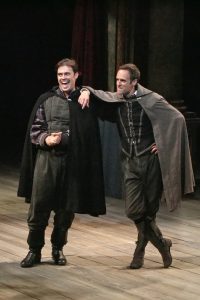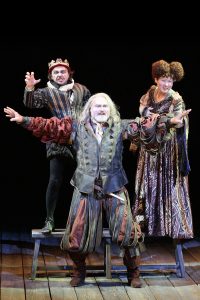Noble Exits Old Globe With Shakespeare/Beckett Mash
Tom Stoppard was reviewing plays in England 50 years ago when he decided to try writing them instead. His first success was a bastard hybrid of Shakespeare and Beckett titled Rosencrantz and Guildenstern are Dead, in which two minor characters from Hamlet confront existence.

John Lavelle, left, and Jay Whittaker in Old Globe Theatre’s Rosencrantz and Guildenstern Are Dead. Michael Lamont Photo
The half-centennial of this early play by a modern master probably isn’t the reason it has been included on the Old Globe Theatre’s menu this summer. Adrian Noble likes reviving one neglected contemporary piece to rotate with a brace of premium Shakespeares for the summer. And if there’s a reference to Shakespeare, as in The Madness of George III, so much the better.
Also, as we’ve learned over four seasons now, Adrian Noble can make almost anything work.
Rosencrantz and Guildenstern are the pair of dim-witted courtiers used by King Claudius to find out what’s bothering his nephew Hamlet, which is sort of like sending Abbott and Costello to analyze Winston Churchill. Stoppard frames them with a fish-eye lens, dithering and arguing while fragments of the immortal drama flash past them with only an occasional acknowledgement. Confusion and despair gradually build as they feel themselves sliding helplessly toward some unseen fate.
It’s like Waiting For Godot in tights. And without the recycle ending. R&G are the two tramps struggling to understand why they’re there. A blustering old actor headed, like them, for the court of Claudius, drives the so-called plot in the same way the encountered bully Pozzo reanimates Godot. And Lucky, the mute slave carrying Pozzo’s baggage, provides fleeting diversion, like the scraps of Hamlet. But what it’s all about, really, is the anguish of existence, whatever (implies the author) that means.
(In a note to the printed version, Stoppard wrote: “In other words, a play isn’t the end product of an idea – the idea is the end product of a play.”)
If all this sounds like gooey Theatre of the Absurd, just remember the time and the author. Young Stoppard was wallowing in word play and paradox like a bright schoolboy influenced almost equally by vaudeville and Sartre. It’s only occasionallyh that Abbott and Costello actually take over:
“That’s been true as long as I can remember.”
“How long is that?”
“I forget.”
Then, even the most innocent remarks begin to fall apart: “And the toenails, on the other hand…”
This also is a play for making huge and evil fun of actors. For bouts of question and answer scored like tennis. And for pompous declarations that collapse upon delivery like a paper bag filled with water.
Among the sleek and sturdy company he has assembled for a summer also including The Merchant of Venice and A Midsummer Night’s Dream, Noble has had no trouble casting this bauble. The only roles of note are the title pair and the old actor, played with fustian gusto by Sherman Howard, who certainly knows how to fill a stage and cast an innuendo.

Kushtrim Hoxha, Sherman Howard and Stephen Hu, left to right, in Old Globe Theatre’s Rosencrantz and Guildenstern Are Dead. Michael Lamont Photo
Jay Whittaker, who specialize in high-energy whippets, and John Lavelle, this summer’s biggest surprise for his subtly askew attitudes and his vocal surprises, are quite engaging as Rosencrantz and Guildenstern. No, wait, it’s the other way around. Or, as Stoppard, Shakespeare, the actors and probably Shakespeare himself might say: “Whatever.”
Ralph Funicello has added a restless proscenium arch, a passable sailing ship with convenient trick barrels on its deck and a jaunty, ramshackle travelling theatrical wagon to his basic summer set. Deirdre Clancy has wisely and appropriately dressed the company as if from the house wardrobe and Alan Burrett’s lighting is always where it should be (and quick with the follow spots when it’s not). Dan Moses Schreier’s music choices range between Game of Thrones and Hallmark Greeting Cards.
Noble indulges us (and himself) with such whimsies as a television crew that follows the Hamlet show in and out and a full-throttle preview of the travelling troupe’s wares. Everybody involved probably found playing such antics as rewarding as Stoppard did in writing them.
So, thus ends the four summers during which Adrian Noble restored order and luster to a long and honorable tradition. His dozen productions have established a tradition of their own: A deep and versatile company, dedicated to speaking the words and projecting the movement in service of the texts, with fun always just around the next quatrain but never allowed to sprawl. All that’s not easy, folks, and now Barry Edelstein inherits a bar that’s used to being set high.
I’m already anticipating the triumphant return of Adrian Noble, guest director.
[box] Continues in rotation with A Midsummer Night’s Dream and The Merchant of Venice through Sept. 28, 2013.[/box]

Welton Jones has been following entertainment and the arts around for years, writing about them. Thirty-five of those years were spent at the UNION-TRIBUNE, the last decade was with SANDIEGO.COM.



What a privilege to watch Adrian Noble’s art these past 4 summers. I cannot remember a better run. Please come back, sir! And bring back this summer’s cast, while you’re at it. Thank you, Old Globe!!